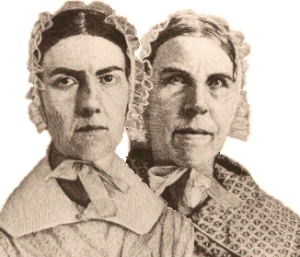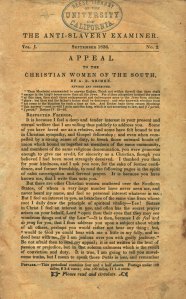Some of the first advocates of women’s rights and the abolition of slavery were two sisters from Charleston, South Carolina, Sarah Grimke (1792-1873) and Angelina Grimke (1805-1879). The Grimke sisters were “raised in the cradle of slavery” and were the daughters of a wealthy plantation owner, Judge John Fauchereaud Grimke. Even though the girls grew up with the privilege and comfort of their aristocratic life, they grew to despise the institutions they were so much a part of: slavery and patriarchal societies that oppress women. As young girls, the sisters taught their slaves to read, something that was highly punishable not only on the plantations, but by law.
Sarah accompanied her father to Philadelphia in 1819, and it was there that she encountered the Society of Friends, or Quakers. The Quaker’s view on equality of the sexes and antislavery resonated with Sarah, and she eventually converted to Quakerism, and Angelina later on. The Grimke sisters moved to Philadelphia, and that move gave them the motivation and confidence to know, that as women, they could make a difference and have their voices heard.
Angelina published a pamphlet called “Appeal to the Christian Women of the South”. This document was directed at Southern, white women, and it was a call to arms to help end the institution of slavery. The pamphlet was burned and criticized in many areas of the South in opposition to the Grimke sisters’ message. Sarah and Angelina began a speaking tour of over 67 cities, mostly in the North, which was “unheard of women of the time… Angelina’s last speech of the tour, to the Massachusetts Legislature, made her the first woman in American history to speak in front of a legislative body”. Sarah and Angelina’s involvement and fervor on the subjects of abolition and women’s right lead to a lot of “condemnation from religious leaders and traditionalists who did not believe that it was a woman’s place to speak in public”.
These groundbreaking women helped pave the way for future abolitionist and women’s rights activism. They broke from their privileged, plantation life and linked the struggles of women and slaves in order to create the hope for an equal and progressive future, free of oppression.
Sources:




